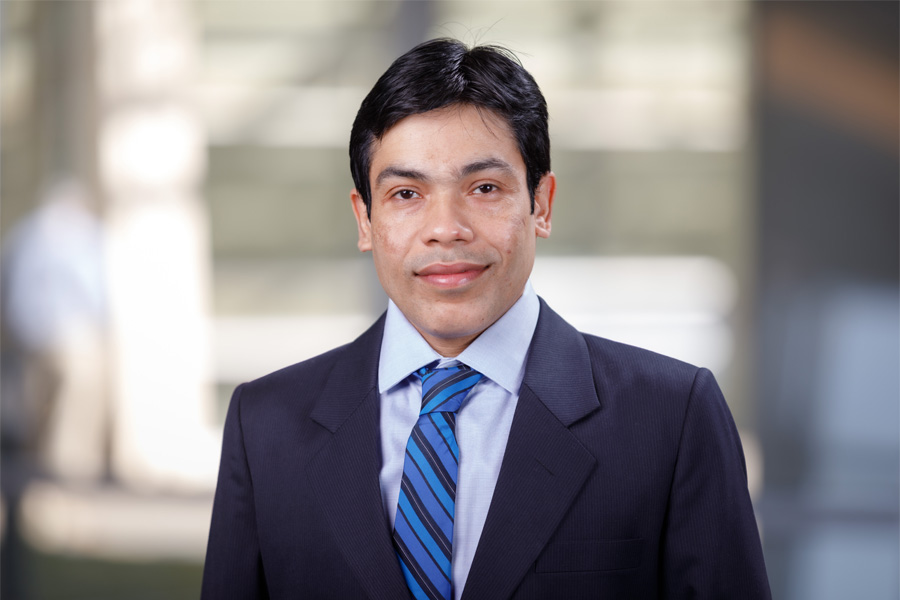Prasanta Dash, PhD

Research
My major focus is to understand the drug-drug interactions on molecular pathways for HIV therapeutics and elimination. Thirty-seven years after the discovery that HIV is the causative agent of AIDS, there is still the problem of drug adherence, drug dosing and appearance of drug resistant strains, and unfruitful targeting of drugs to the latent reservoirs in the patients. There are only two documented cases of HIV-1 functional cure till date. The subsequent success was stalled because of 1) limited therapeutic access to viral reservoirs, 2) the known rapid spread of viral infection, 3) much higher numbers of viral susceptible cells in HIV-1 target tissues and 4) an inability to completely eliminate integrated proviral DNA. Viral rebound is uniformly seen after cessation of antiretroviral therapy (ART). To address each of these limitations, I am working with a medicinal chemistry team to improve drug penetrance across cell and tissue barriers and to improve control over ongoing viral infection. We reasoned that, under conditions of optimal viral restriction, deployment of CRISPR/Cas9 proviral DNA excision strategies targeting specific host genes responsible for viral entry and multiple regions of HIV-1 genome would facilitate elimination of HIV-1 from the host genome. This will be validated using multiple highly sensitive molecular detection in vitro and in vivo assays.
Ongoing projects
- Targeting HIV-1 elimination using a sequential combinatorial treatment paradigm in Humanized Mice
- Detection and targeting of HIV-1 reservoirs using multimodal approach: In our collaborative work with Drs. Howard Gendelman and Bhavesh Kevadiya, we are trying to develop a new theranostic nanosystem to optimize site-directed antiretroviral drug (ARV) delivery to infected cells and tissues to enable maximal viral restriction in lymphoid reservoirs and brain in a novel mouse model of HIV disease and to track and treat HIV-1.
- Understanding the cytokine and metabolic changes at the cellular and molecular level in HIV-infected and/or treated and virally suppressed humanized mice tissue samples isolated from myeloid, lymphoid, and CNS compartments
- Development of ultra-sensitive in vivo detection assay system for HIV-1, studying hu-NSG mouse-based viral outgrowth assay (MVOA) that can successfully recover virus from virally suppressed humanized mouse tissues isolated from myeloid, lymphoid, and peripheral compartments. These mVOA assays will be employed in future to interrogate HIV-1 latency from individual tissue or cell type of interest and can become standard validation assays to confirm HIV-1 elimination.
- Development of a testing pharmacodynamic (PD) platform for the development of antiretroviral and adjunctive therapies for peripheral HIV-1, and for its related associated neurocognitive disorders
Funding
HIV Theranostics
PI: Gendelman, H.E./Dash, P.K.
NIH/NIMH R01MH121402
This award is to look at HIV-1 reservoirs specifically targeting CNS compartments. We proposed multimodal theranostic imaging approach to detect the virus using a small animal model of HIV-1 disease (humanized-microglial mice).
Recognition
- 2020: New Investigator Award from UNMC
- 2015: Young Investigator Award from CROI, Seattle, WA
- 2014: Young Investigator Award from CROI, Boston, MA
- 2013: Young Investigator Award from CROI, Atlanta, GA
- 2012: Young Investigator Travel Award from SNIP, the 18th Annual Conference of the Society on Neuroimmune Pharmacology (SNIP), Honolulu, HI
- 2011: Young Investigator Award from CROI, Boston, MA
- 2007–2008: Visiting Research Scientist Fellowship from AIDS International Training Research Program (AITRP) from Albert Einstein College of Medicine, NY
- 2007: Global Health Travel Award from Melinda and Bill Gates Foundation, to attend Keystone Symposia, British Columbia, Canada
- 2006: International Travel Award from Department of Science and Technology (DST), to attend the XVI International AIDS Conference held in Toronto, Canada.
- 2005: International Travel Award from the 11th International workshop on viral evolution and molecular epidemiology held in Petropolis, Rio De Janeiro, Brazil
Memberships
- 2010–present: Member, Society of NeuroImmune Pharmacology (SNIP)
- 2013–present: Member, International Antiviral Society- USA (IAS-USA)
- 2010–2014: Member, Society for Neuroscience (SFN)
Durham Research Center 8047
985880 University of Nebraska Medical Center
Omaha, NE 68198-5880